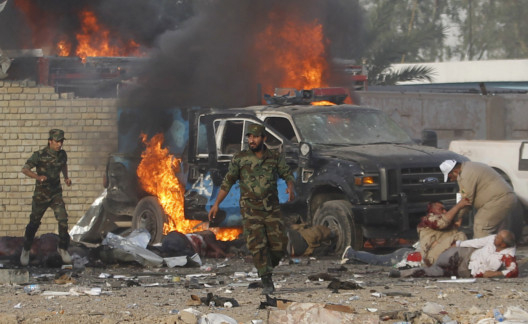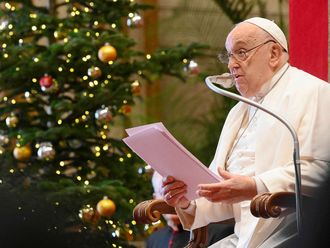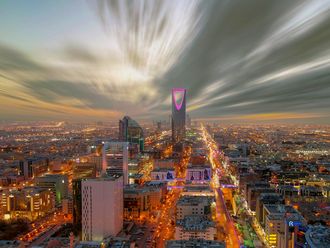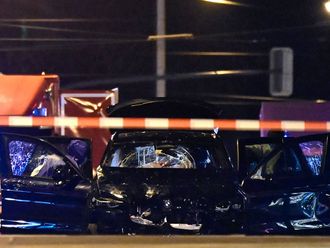
Baghdad: Suicide bombers killed 33 people on Friday at a sports stadium hosting a campaign rally for thousands of supporters of a militant Shiite group before parliamentary elections, authorities said — an attack that could unleash more sectarian violence.
An Al Qaida breakaway group, the Islamic State of Iraq and the Levant (Isil), claimed responsibility for the attack at the Industrial Stadium in eastern Baghdad, which drew about 10,000 backers of the Iranian-backed Asaib Ahl Al Haq group.
It said on a militant website that the bombings were to avenge what it called the killing of Sunnis and their forced removal from their homes by Shiite militias.
The authenticity of the claim could not be independently verified.
The attack was a stark reminder of the sectarian violence that has plagued Iraq more than two years after US troops ended an eight-year presence that often served as a buffer between the nation’s Shiite majority and its Sunni Arab minority.
Last year, the death toll in the country climbed to its highest levels since the worst of the sectarian bloodshed between 2006 and 2008. The UN says 8,868 people were killed in 2013, and more than 1,400 people were killed in the first two months of this year alone.
The rally was organised to introduce the group’s candidates for Wednesday’s vote. More than 9,000 candidates are taking part and will vie for 328 seats in parliament. Parts of the Sunni-dominated Anbar province won’t take part in the election due to the clashes there between security forces and Al Qaida-inspired militants.
A top intelligence officer and security officials said a senior Sunni politician in the southern city of Basra, Abdul Kareem Al Dossary, was shot and killed on Friday night in what appeared to be a revenge attack for the Baghdad bombings. The officer and the officials spoke on condition of anonymity because they were not authorised to brief the media.
The resurgence of sectarian violence is in part a reflection of the 3-year-old conflict in neighbouring Syria, where forces loyal to President Bashar Al Assad are battling mostly Sunni rebels whose ranks are dominated by Islamists or militants from Al Qaida-inspired or linked groups. Al Assad follows the Alawite faith, an offshoot of Shiite sect. Asaib Ahl Al Haq, like Lebanon’s Shiite Hezbollah, has sent fighters to Syria to join Al Assad’s side in the civil war.
The bombings at the heavily guarded stadium struck about 10 minutes apart, according to two Associated Press reporters at the rally.
Intense gunfire rang out after the first explosion and continued throughout, but it is not uncommon for Iraqi security forces to fire in the air after major attacks.
Some in the crowd fled to a nearby building under construction in the complex as female parliamentary candidates screamed and prayed for safety. Others ran from the stadium or took refuge behind the large stage erected for the rally.
Adding to the panic was the appearance overhead of a low-flying small aircraft that dropped election pamphlets.
The first explosion struck as men and women in colourful Arab medieval costumes were engaged in a short performance of a play depicting the 7th century martyrdom of the Shiites’ most revered saint, Imam Hussain, in Karbala, Iraq.
An AP driver outside the stadium’s main gate said he was thrown back by the first blast before a second shook the area. He said guards around him began firing in all directions.
Another witness said he rushed out of the stadium with his friends after the first explosion.
“I saw four charred bodies and several wounded people asking for help. There were also several damaged cars. Then, other blasts took place. People were in panic,” said the man, who gave his name as only Abu Sajad.
The rally was addressed by Asaib Ahl Al Haq’s leader, Shaikh Qais Al Khazali, a young cleric who had spent years in US detention but was released after he was handed over to the Iraqi government. In his speech, he challenged the Sunni militants holding parts of two cities in Anbar province, which is predominantly Sunni.
“We are ready and prepared to defend this nation,” said Al Khazali, a one-time close aide of anti-US Shiite cleric Moqtada Al Sadr. “Let it be known that Asaib will be the remedy.”
Security guards jumped on Al Khazali after the first explosion, and then rushed him to his armoured SUV.
The group remained defiant after the attack.
“This is a desperate act that will not stop us from moving on and challenging” the Sunni militants, said a senior Ahl Al Haq official, Wahab Al Taie. “They wanted to send us a message and they did, but that will not deter us.”
Police and medical officials said on Saturday that the attack killed at least 33 people and wounded 40. They said the first two blasts were caused by bombs, but the third was the work of a suicide bomber. The officials spoke on condition of anonymity as they weren’t authorised to release the information. It was not immediately possible to reconcile the officials’ version with that given by the Isil, which spoke of two suicide bombers.
Followers of Asaib Ahl Al Haq attacked US troops before their withdrawal in 2011 and claimed responsibility for the 2007 kidnapping in Baghdad of a British contractor along with his four guards. The group is backed by Iran and openly admits sending fighters to Syria to bolster Al Assad’s forces.
The top of the Baghdad stadium’s terraces was adorned by images of Asaib Ahl Al Haq fighters killed in Syria.
“They fight Iraq’s enemies there on the land of Syria,” Al Khazali said, alluding to fighters in Syria.
The Isil and other Sunni militants frequently use car bombs and suicide attacks to target public areas and government buildings in their bid to undermine confidence in the Shiite-led government and target Shiite groups.












